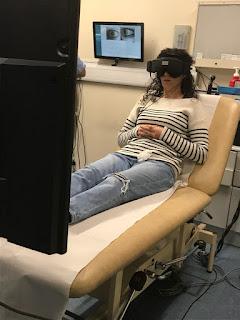My unsteady self
Ever since contracting Meningitis at age just two, https://mynonvisualstruggles.blogspot.com/2018/10/my-meningitis-story.html. I've lived with balance issues. Growing up I experienced short bouts of vertigo once in a while, but nothing prepared me for the uphill battle I was about to face.
Off to the hospital, I go. And within a short period of time after arriving at the hospital, I was being prepped for my appointment, little I knew I'd be spending a whole afternoon being assessed by three different balance specialists. Probably one of the worst afternoons of my life! The abbreviation version of the horrendous tests I was made to endure was like being inside a tumble dryer/washing machine.
Moi during testing 😒
A few weeks later I received the specialist's report which was three pages long!😲😲😲
- Severe positional dizziness (5/5 severe dizziness related disability)
- Significant and marked visual vertigo
- Vestibular hypofunction
- Dizziness (severe activity limitations 78/100)
A common cause of vertigo, visual disturbance, and loss of balance is vestibular hypofunction.
Vestibular: inner ear balance system.
Hypofunction: it is not functioning at 100%. in other words it is underperforming so it is not sending balance signals to the brain correctly.
Balance organs are damaged, The damage can be complete or partial, it can be on one side or both sides. The sensory cells in the organs are not sending signals correctly to the brain. The brain is confused therefore movements of the head or body results in vertigo, visual disturbance, and loss of balance. (my unsteady self in a nutshell)
Common causes of vestibular hypofunction:
- Meningitis
- Trauma or head injury
- Meniere Disease or hydrops
- Ramsay Hunt Syndrome
- Acoustic neuroma - the following surgery to remove the benign tumour
- Labyrinthitis - the balance organs themselves are damaged
- Gentamycin Ototoxicity - a specific antibiotic that has the ability to kill the sensory cells in the inner ear
- Vestibular neuritis - the nerve connecting to the balance organ is damaged so signals are blocked before they can be transmitted to the brain
- Vertigo (spinning sensation)
- Nausea
- Loss of balance
- Dizziness (light headed, disorientated, spacey)
- Walking impairment
- Coordination impairment
- Blurred vision
Treatment of vestibular hypofunction:
- Visual stability exercise
- Exercise to decrease motion sensitivity
- Balance exercise
The treatments are designed to move and train your brain and your inner ear system. The aim is to improve the visual stability. It means that the eyes should be able to track the environment while moving the head and body 😵😵😵 YOU WILL HAVE TO GET DIZZY TO IMPROVE 😭😭😭 (not trying to scare you)
The only way to improve is to teach the brain to pay more attention. Basically reprogramming the whole balance system including this brain of mine.
Remember that treatments are progressed gradually at each step to accommodate your tolerance level.
The simplest of physical activity such as standing, sitting or laying can help a great deal.
THE KEY CONCEPT IS THAT YOU MUST MOVE TO GET BETTER. Sorry to be the bearer of bad news.
If you have enjoyed my blog post please share it with family, friends or someone in need of reassurance that they are not suffering alone!





Comments
Post a Comment